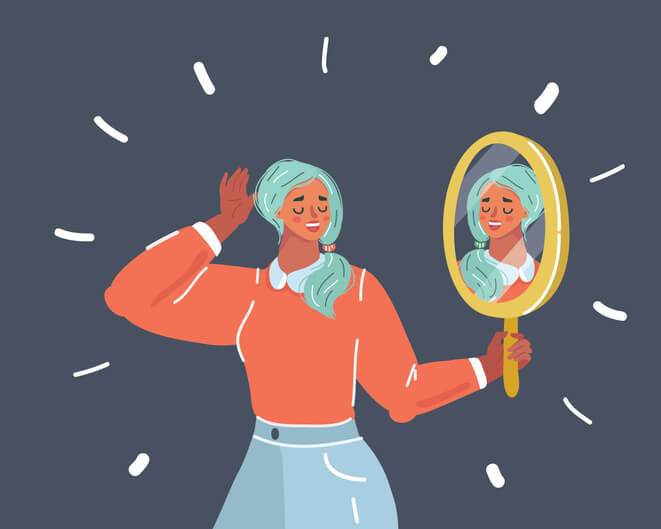 Our society makes it incredibly easy to feel like we are not good enough and that we will never be good enough, no matter how hard we try. In fact, many societal standards are completely unattainable. Think about female beauty standards for example.
It is impossible for women to look like those on the cover of fashion and beauty magazines, and that's because the real life version of the women on those magazines don't even look like that. The images we are bombarded with on a near daily basis are the
result of hours of work by professional makeup artists, hair stylists, and photographers with the most expensive cameras, tools, and lighting…and on top of all that, the images are often photoshopped. We will never be able to compete with an image that has
been altered to remove pores, or lift cheekbones, or whiten teeth. Some articles report that 90-100% of these images are photoshopped. Even when we know these images are photoshopped, they still negatively impact our mental health.
Our society makes it incredibly easy to feel like we are not good enough and that we will never be good enough, no matter how hard we try. In fact, many societal standards are completely unattainable. Think about female beauty standards for example.
It is impossible for women to look like those on the cover of fashion and beauty magazines, and that's because the real life version of the women on those magazines don't even look like that. The images we are bombarded with on a near daily basis are the
result of hours of work by professional makeup artists, hair stylists, and photographers with the most expensive cameras, tools, and lighting…and on top of all that, the images are often photoshopped. We will never be able to compete with an image that has
been altered to remove pores, or lift cheekbones, or whiten teeth. Some articles report that 90-100% of these images are photoshopped. Even when we know these images are photoshopped, they still negatively impact our mental health.
There is a reason magazines show us images that perpetuate our insecurities. Companies make money off of us being unhappy with ourselves. In 2020, sales in the beauty industry was $483 billion. We are taught to be insecure about the way completely normal bodies look and we are sold products that claim they will make us more desirable. But no amount of products will ever make us look like the photoshopped people on magazine covers so we beat ourselves up and buy more. This cycle is terrible for our mental health and can lead to negative self-talk.
Negative self-talk is the little voice inside our head that criticizes us and tells us we are not good enough. Do you ever compare yourself to your coworkers and think "I'll never get that promotion" or have you ever looked at yourself in the mirror and thought "If only I could lose 10lbs"? This is negative self-talk. It causes our confidence to plummet which can lead to feelings of anxiety, loneliness, emptiness, and shame. Especially when we feed ourselves these messages day after day, year after year. When we think these negative thoughts about ourselves, we don't leave much room for positive self-talk or accepting and loving ourselves for exactly as we are. Luckily, we can reverse the damage of negative self-talk and unrealistic societal standards.
Our brains are malleable, meaning they process information and adapt or adjust, changing the way we think and act. For example, if you have engaged in negative self-talk for years then your brain becomes used to it, leaving you feeling anxious and depressed. However, with practice and patience, you can change the way you think about yourself, which allows your brain to adjust, leading to confidence and improved self-esteem. Self-love and self-acceptance are two practices that we can incorporate into our daily routine to start to accept and celebrate ourselves. While these two terms are interrelated, they refer to different things that we can work on together. Self-love refers to acknowledging the things that we love about ourselves. When we engage in negative self-talk, we leave little room to actually notice the things that we like about ourselves, so noticing them can help us counter the negative thoughts. For many people, especially those starting out in this journey, self-love is challenging. If this is you, you can start with practicing self-acceptance. You don't need to change a single thing about yourself in order to accept yourself for exactly how you are right now. There may be things you want to change, and that is fine, but beating yourself up won't get you anywhere closer to feeling at peace with yourself.

Practicing self-love and self-acceptance is really hard work, especially when we have been receiving negative messaging and engaging in negative self-talk for years. The best part about these tools is that you can start them today! You don't need to change anything about yourself to be worthy of love. Engaging in self-love is a radical act because it frees you from societal pressures to be anything other than who you already are.